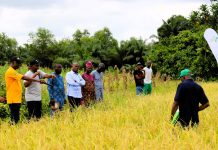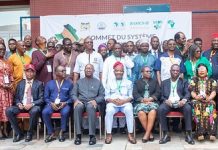By Arison TAMFU
Peru, Lima, and Dec. 2: Ana Faustor, a middle-aged Peruvian lady takes a passionate biteat a grilled fish as she follows proceedings at the UN Climate change talks in Lima just outside the hall where deliberations are taking place. Inside the hall, officials reflect on how dangerous climate change has become to mankind and insist that the time to act is now but Ana`s thoughts are buried in nostalgia of the days of abundant fish and how she used to go fishing with her father in Chimbote, in the north of South American country, Peru.
“Things have changed now. Fishing is becoming difficult and fishes are disappearing” she says regretting how good fish is becoming rare in Peru, a country that holds second place in the worldwide production of aquatic species. As the UN Climate change conference opens this Dec. 1 in Peru, Ana hopes for an outcome that will mitigate the impacts of climate change across the globe.“That is why I am attending the conference. Things are getting out of hand. We do know what to do” she laments. Millions of miles across the Ocean in Limbe, a town in West African country, Cameroon, Enoh Joseph shares her sentiments.“My catch has reduced drastically. Sometimes I stay for days without going to fish because of bad weather. Sometimes I wonder what we have done wrong to nature” says Enoh who has been fishing for over two decades.Ana may be worried about the dwindling production of fish in Peru but for African fish traders and fishermen like Enoh, it is a question of life and death.“Fishing is my life. I feed my family from fishing; send my children to school from fishing, in brief all my life is about fishing. I fear for the future so much” says Enoh.The West African region is home to about 43% of the total population in Sub Saharan Africa. The fisheries sector plays an enormous role on the national economies of the region and constitutes the main livelihood for a majority of people living along the coasts and in riparian areas. Countries like Senegal, The Gambia, Sierra Leone and Ghana largely depend on fisheries for their national economies and as a major source of foreign revenue. In Cameroon, Benin, Ghana, Mali, Mauritania and Senegal, more than half of the population consumes fish products daily.According to a report by UN Food and Agriculture Organisation (FAO), in 2006, high demand for fish and associated products led to more than five million fishers, fish processors and fish traders in the region, besides other jobs such as boat building and small scale business in the fisheries sector. In Cameroon, fisheries provide jobs for marginalized groups- mostly women who dominate processing, retailing and local trading of fish products but climate change is threatening the flourishing industry.“Here at the UN climate change Conference in Lima, the scientific report made it clear that the impact of climate change will be more intense and more frequent and the fishing industry is not left out. Because of rising sea levels and floods, fishermen are finding it difficult to go fishing with the boats in the troubled waters. Many have to stop fishing. So the fishing industry is affected. In Cameroon for instance, fishermen are complaining they can`t go into the sea because of the wild waves. Therefore the market chain is affected and that goes across Africa” says Robert Chimambo, a member of Pan African Climate Justice Alliance (PACJA), a continental coalition of Civil Society Organizations defending the position of Africa in climate change talks.Forecasts of fish production in the future indicate that majority of the fisheries will be affected by climate change, and may cause food insecurity. With regional fish stocks already on the decline, per capita fish consumption has declined. It is speculated that demand for fish will exceed supply in West Africa, with an annual decrease in fish supply by 4% per year, leading to a supply deficit of 3.6 M t in 2015.“The fisheries productivity of West Africa is highly vulnerable to projected impacts of climate change. The region is ill-prepared to safeguard the fisheries sector from these projections. Consequently, the traditional support provided by the fisheries such as food security is threatened if not in deterioration, and it is not well known whether the region would be able to meet its nutritional demands under the worst case scenario of climate change” says Robert Katikiro who has researched extensively on the impacts of climate change on the fish industry in Africa.In a study conducted in 2012, Robert Katikiro and Edison Macusi found that the magnitude of the problem in terms of its severity and proportion of the population affected differ from country to country even at household level. According to the study, food production has declined in countries such as Liberia, Sierra Leone, Ghana, and Senegal leading to their dependence on food aid.“The reliance on foreign food staples means that no country in the region is self-sufficient in terms of food production” says KatikiroFAO estimates that Africa will need adequate food supplies for 18 million additional people each year and to improve the nutritional status of the 94 million people currently undernourished if it is to meet the Millennium Development Goal.Experts are unanimous that urgent actions need to be taken to improve awareness of fishers and fishing communities about the impacts of climate change on their livelihood.“Concerted efforts should be taken from local to regional level to address adaptation to climate change. Fishers and fishing communities should be empowered to make them venture to other livelihood occupations and their Fisheries should be climate-proofed” says Kitikiro.Chimambo who is actively taking part in the UN Climate Change talks in Peru is committed to ensuring that activities that make people, ecosystems and infrastructure less vulnerable to the impacts of climate change are raised and fully discussed at the Conference.“Basically the whole process of adaptation is to try and raise those issues. How do our people get compensated for this damage? That is why the negotiations for loss and damage are crucial. And our people (Africans) did not cause the damage; they are victims of climate change which is caused by developed nations. The technology that we were using when the sea was normal is getting out of place. So we need research to introduce new methods of fishing. And that requires investment, not from African governments’ budgets but developed countries that are responsible for climate change” he says.For the two weeks (Dec.1–12) of climate change talks here in Lima, genuine and universally accepted decisions need to be taken to rescue people like Ana and Enoh from perishing with impact of climate change.





















